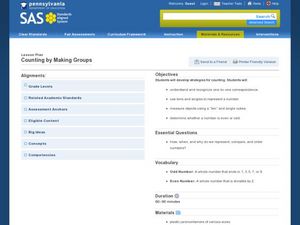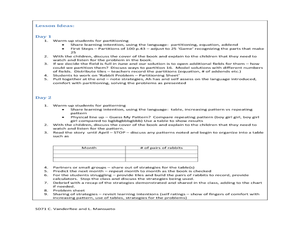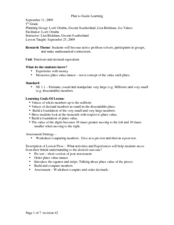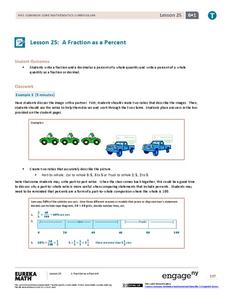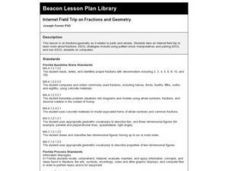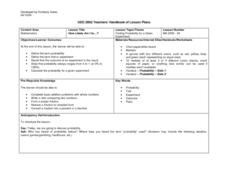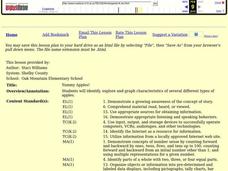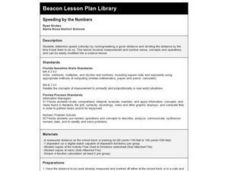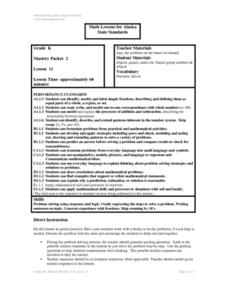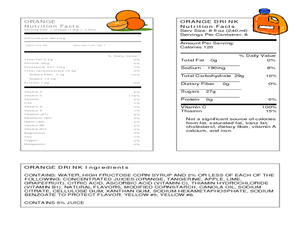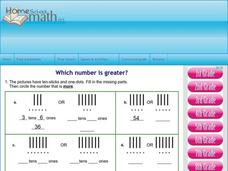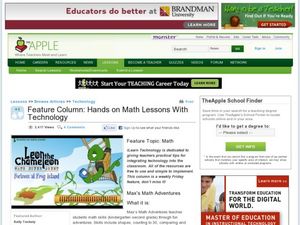Curated OER
Counting by Making Groups
First graders represent, compare, and order numbers. In this counting skills lesson, 1st graders use manipulatives to demonstrate one-to-one correspondence and to represent numbers. This lesson includes a teacher script to guide the lesson.
Curated OER
The Rabbit Problem
Students notice a number pattern in the book The Rabbit Problem by Emily Gravett. In this number pattern lesson, students represent and describe numbers appropriate to their grade level.
Curated OER
Equal Shmequal by Virginia Kroll
Pupils read a book and complete exercises to explore the meaning of 'equals.' In this equal numbers lesson, students brainstorm the meaning of equals and read a story about the topic. Pupils use manipulatives to study balance and equal...
Curated OER
Mental Math Blocks
In this mathematics worksheet, pupils solve various types of problems in each of the squares. They use symbols to compare numbers. They also divide and multiply.
Curated OER
Fractions and Decimal Equivalents: Fifth Grade
Sometimes a skeleton is all you get. This lesson outline provides teachers with a basic lesson flow. Pupils will pre-test, order place value names, use manipulatives, and build and compare numbers. How this is to be done is not...
Curated OER
Adding and Subtracting
Students will add and subtract numbers less than 100 as well as understand and use the inverse relationship between addition and subtraction. They compose/decompose numbers up to 10 and understand a variety of situations in which...
EngageNY
A Fraction as a Percent
It is all about being equivalent. Class members convert between fractions, decimals, and percents. By using visual models, scholars verify their conversions in the 25th portion of a 29-part series.
Curated OER
The Number Line
Eighth graders investigate the order of numbers and how they are located on the number line. They also review the symbols used to compare quantities in order to decipher simple expressions and graph them on the numberline.
Curated OER
Internet Field Trip on Fractions and Geometry
Students take an Internet field trip to research fractions. ESOL strategies include using pattern block manipulatives and pairing ESOL and non-ESOL students on computers.
Curated OER
Head, Heart, Hands, Health
Fourth graders complete a compare and contrast activity for American agriculture historical events. In this historical events in agriculture instructional activity, 4th graders review a timeline and complete research for agriculture in...
Curated OER
Probability: How Likely Am I to...?
Twelfth graders examine various ways probability is applied to daily situations. They use marbles and blocks to calculate the probabilities of picking certain colors. They also calculate the odds of picking a winning raffle ticket.
Curated OER
Yummy Apples!
Students discuss apples and how they are grown. They listen as the teacher reads "Apples," by Gail Gibbons. Students discuss the story. They view several different types of apples and compare their characteristics. Students taste several...
Curated OER
One Vs. One Hundred
Students explore the concept of place value. They differentiate between digits and their values as it related to addition and subtraction. Through the use of technology and manipulatives students investigate the place value of digits by...
Curated OER
Speeding By The Numbers
Students determine speed by running or walking a given distance and dividing the distance by the time it took them to do so. They record their average speed and compare it with the speeds of other moving objects.
Curated OER
Fraction Problem Solving Process
Help your charges solve a variety of fraction and skip counting problems using a problem solving process. As a class they work through a fraction problem step-by-step, and discuss a real-life connection to the problem. Students then play...
Curated OER
Healthy Food is Good Food!
Students examine the difference between whole foods and junk foods. In this food lesson, students learn the definitions of whole food and junk food. They find the difference in tastes and textures of different foods by performing taste...
Curated OER
Which Number is Greater?
Pupils draw pictures of two digit numbers to identify the greater value. In this math lesson, students plot two digit numbers on a number line and identify the greatest or lesser value. Pupils use the greater than and less than symbols...
Curated OER
How Many More on a Graph?
First graders identify a number that is one more or one less than a number up to one hundred and identify a mystery number. They also create a class graph that illustrates how many children are in each family, and answer questions about...
Curated OER
Number Books
Young scholars construct a book to illustrate number concepts. They write their numbers on a sheet of paper. Students in grade 1 discuss counting to 100 by different numbers. Pupils in grades (2-4) write basic addition or subtraction...
Curated OER
Feature column: Hands on Math With Technology
Young learners will view a math adventures video and practice math concepts. Afterwards they will navigate through Internet sites to participate in teacher selected math adventures. This guide walks you through integrating technology...
Curated OER
Ten Little Black Dots
Second graders use black and red construction paper to symbolize different one digit numbers that add up to 10. In this sums to 10 lesson plan, 2nd graders discover different combinations and patterns that can lead them to the number 10.
Curated OER
Census Statistics and Graphing
Young scholars graphically represent data from the Census. In this middle school mathematics lesson, students investigate the housing characteristics of different tribes of Native Americans and compare them to the average American...
Curated OER
Drop it or not?
Students explore fractions. In this fraction lesson, students play an interactive game and use manipulatives to practice working with fractions.
NEED Project
Calibrating Thermometers
Engage young scientists in the upper-elementary and middle school grades with this collection of simple experiments. Whether you're teaching about heat transfer, density, or potential energy this resource has a lab for you.


